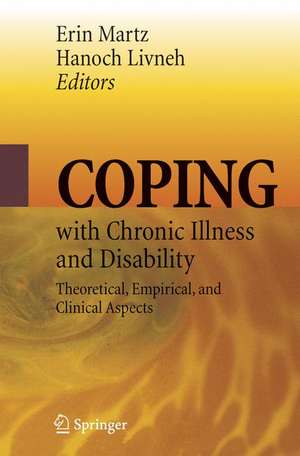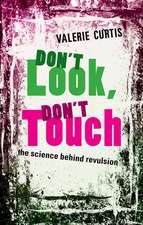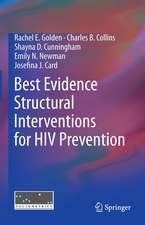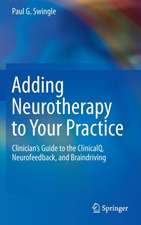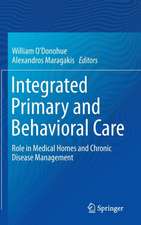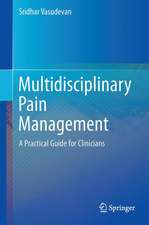Coping with Chronic Illness and Disability: Theoretical, Empirical, and Clinical Aspects
Editat de Erin Martz, Hanoch Livnehen Limba Engleză Hardback – 24 mai 2007
The book’s first section provides readers with the major theories and conceptual perspectives on coping, with special emphasis on social aspects and models of coping with different types of CID. In Part Two, an array of specific medical conditions is covered. Each chapter supplies a clinical description, current empirical findings on coping, effective medical, physical, and psychological interventions, employment issues, and social concerns. This book includes: Up-to-date information on coping with high-profile conditions, such as cancer, heart disease, diabetes, arthritis, spinal cord injuries, and traumatic brain injury, in-depth coverage of HIV/AIDS, chronic pain, and severe mental illness, coverage of therapeutic modalities adopted for treatment of people with CID, review of the current state of coping theory and research, appendix of instruments frequently used in assessment of coping.
The editors’ skillful balance between theoretical and practical material will help rehabilitation specialists (particularly psychologists, counselors, social workers, and health-care providers) develop new insights into promoting successful coping, and discern new means of changing its less effective forms. Students in the helping professions, as well as individuals experiencing CID, may also find this multifaceted book useful for understanding some of the psychosocial dynamics of living with CID.
| Toate formatele și edițiile | Preț | Express |
|---|---|---|
| Paperback (1) | 699.10 lei 6-8 săpt. | |
| Springer Us – 4 noi 2010 | 699.10 lei 6-8 săpt. | |
| Hardback (1) | 952.99 lei 6-8 săpt. | |
| Springer Us – 24 mai 2007 | 952.99 lei 6-8 săpt. |
Preț: 952.99 lei
Preț vechi: 1162.18 lei
-18% Nou
Puncte Express: 1429
Preț estimativ în valută:
182.41€ • 198.21$ • 153.33£
182.41€ • 198.21$ • 153.33£
Carte tipărită la comandă
Livrare economică 21 aprilie-05 mai
Preluare comenzi: 021 569.72.76
Specificații
ISBN-13: 9780387486680
ISBN-10: 0387486682
Pagini: 430
Ilustrații: XXVI, 430 p.
Dimensiuni: 156 x 235 x 25 mm
Greutate: 0.82 kg
Ediția:2007
Editura: Springer Us
Colecția Springer
Locul publicării:New York, NY, United States
ISBN-10: 0387486682
Pagini: 430
Ilustrații: XXVI, 430 p.
Dimensiuni: 156 x 235 x 25 mm
Greutate: 0.82 kg
Ediția:2007
Editura: Springer Us
Colecția Springer
Locul publicării:New York, NY, United States
Public țintă
Professional/practitionerCuprins
I.- An Introduction to Coping Theory and Research.- Psychodynamic and Cognitive Theories of Coping.- Hierarchical Coping: A Conceptual Framework for Understanding Coping Within the Context of Chronic Illness and Disability.- The Social Context of Coping.- Reauthoring the Self: Chronic Sorrow and Posttraumatic Stress Following the Onset of CID.- Adaptive Tasks and Methods of Coping with Illness and Disability.- II.- Coping with AIDS: The Challenges of an Evolving Disease.- Coping with Arthritis: From Vulnerability to Resilience.- Coping with Burn Injury: Research Summary and a New Model of~the~Influence of Coping on Psychological Complications.- Coping with Cancer: Findings of Research and Intervention Studies.- Coping with Diabetes: Psychological Determinants of Diabetes Outcomes.- Coping with Epilepsy: Research and Interventions.- Coping and Heart Disease: Implications for Prevention and Treatment.- Coping with Multiple Sclerosis: Considerations and Interventions.- Coping with ChronicPain: A Stress-Appraisal Coping Model.- Coping with Severe Mental Illness: A Multifaceted Approach.- Coping with Spinal Cord Injuries: Wholeness Is a State of Mind.- Coping with Traumatic Brain Injury: Existential Challenges and Managing Hope.
Recenzii
From the reviews:
"This is a landmark work, one that is long overdue: It marks the first time contemporary theories of coping are integrated with the basic tenets of rehabilitation psychology. . . Congratulations to Martz and Livneh for producing a book that will be required reading for the future study of coping among persons with chronic disease and disability."
-Timothy R. Elliott, Ph.D., ABPP, Department of Educational Psychology, Texas A&M University, College Station, Texas
"The Martz and Livneh text addresses the important topic of coping with chronic illness and disability. The initial six chapters review the major theoretical perspectives on coping, including empirical documentation. The final twelve chapters review theory and research specific to major types of chronic illness and disability, including interventions that have been applied to facilitate coping and research supporting their efficacy. The content is both substantive and scholarly,with many practical clinical applications. The text should be a welcome addition to the libraries of rehabilitation and health professionals, including both researchers and clinicians, and it would also be an excellent textbook for university courses on the psychosocial aspects of chronic illness and disability."
-Norman L. Berven, University of Wisconsin-Madison
"Perhaps once a decade a 'classic book' appears and I think that Coping wth Chronic Illness and Disability: Theoretical, Empirical, and Clinical Aspects will be in this prestigious company. This book is a confluence of brilliant minds working from very unique perspectives and life experiences. They have captured the essence of coping with chronic illness and disability and examined it through the lenses of potential human resilience while validating the totality of the full human experience. In turn, they have constructed a living mosaic that captures needs, realities, and aspirations of people living with, and often in spite of and beyond, chronic illness and disability.
The scope and depth of the content captures and reflects what could and should be when contemplating and addressing this very complex area of study, research, and application. This is not at all surprising, since the authors/ editors, Martz & Livneh are both acknowledged by there peers as masters of the content area. In addition, they also added the insights and perspectives of many collaborators who have enhanced and enriched the focus and message of this work. The insights and "imprimatur" of Dr. Beatrice A. Wright says it all.
I found this work to be profound, relevant, inspirational and challenging. The richness of the material grasps and holds the attention of the reader; the frames of reference provide cognitive and emotional tools to process and related the material to real life issues and applications. Not only did I have the privilege of reading this material, I have the opportunity to learn more about coping with chronic illness and disability from master scholars, researchers and teachers who not only have presented the content but also had the vision to create and develop a book that shares their wisdom with us all."
- Arthur E. Dell Orto, Ph.D. C.R.C., Professor & Director of the Rehabilitation Counseling Program, Department of Occupational Therapy & Rehabilitation Counseling, Associate Executive Director, Center for Psychiatric Rehabilitation, Boston University
"This book describes how individuals cope with chronic illness and disability, covering conceptual, empirical, and clinical aspects. The contributors discuss coping with 12 specific illnesses. … The book is intended for rehabilitation specialists, particularly psychologists, counselors, social workers, and healthcare providers, as well as students in the helping professionals and individuals experiencing CID. … tackles the topic of copying with chronic illness and disability very completely." (Gary B Kaniuk, Doody's Review Service, November, 2007)
"This is a landmark work, one that is long overdue: It marks the first time contemporary theories of coping are integrated with the basic tenets of rehabilitation psychology. . . Congratulations to Martz and Livneh for producing a book that will be required reading for the future study of coping among persons with chronic disease and disability."
-Timothy R. Elliott, Ph.D., ABPP, Department of Educational Psychology, Texas A&M University, College Station, Texas
"The Martz and Livneh text addresses the important topic of coping with chronic illness and disability. The initial six chapters review the major theoretical perspectives on coping, including empirical documentation. The final twelve chapters review theory and research specific to major types of chronic illness and disability, including interventions that have been applied to facilitate coping and research supporting their efficacy. The content is both substantive and scholarly,with many practical clinical applications. The text should be a welcome addition to the libraries of rehabilitation and health professionals, including both researchers and clinicians, and it would also be an excellent textbook for university courses on the psychosocial aspects of chronic illness and disability."
-Norman L. Berven, University of Wisconsin-Madison
"Perhaps once a decade a 'classic book' appears and I think that Coping wth Chronic Illness and Disability: Theoretical, Empirical, and Clinical Aspects will be in this prestigious company. This book is a confluence of brilliant minds working from very unique perspectives and life experiences. They have captured the essence of coping with chronic illness and disability and examined it through the lenses of potential human resilience while validating the totality of the full human experience. In turn, they have constructed a living mosaic that captures needs, realities, and aspirations of people living with, and often in spite of and beyond, chronic illness and disability.
The scope and depth of the content captures and reflects what could and should be when contemplating and addressing this very complex area of study, research, and application. This is not at all surprising, since the authors/ editors, Martz & Livneh are both acknowledged by there peers as masters of the content area. In addition, they also added the insights and perspectives of many collaborators who have enhanced and enriched the focus and message of this work. The insights and "imprimatur" of Dr. Beatrice A. Wright says it all.
I found this work to be profound, relevant, inspirational and challenging. The richness of the material grasps and holds the attention of the reader; the frames of reference provide cognitive and emotional tools to process and related the material to real life issues and applications. Not only did I have the privilege of reading this material, I have the opportunity to learn more about coping with chronic illness and disability from master scholars, researchers and teachers who not only have presented the content but also had the vision to create and develop a book that shares their wisdom with us all."
- Arthur E. Dell Orto, Ph.D. C.R.C., Professor & Director of the Rehabilitation Counseling Program, Department of Occupational Therapy & Rehabilitation Counseling, Associate Executive Director, Center for Psychiatric Rehabilitation, Boston University
"This book describes how individuals cope with chronic illness and disability, covering conceptual, empirical, and clinical aspects. The contributors discuss coping with 12 specific illnesses. … The book is intended for rehabilitation specialists, particularly psychologists, counselors, social workers, and healthcare providers, as well as students in the helping professionals and individuals experiencing CID. … tackles the topic of copying with chronic illness and disability very completely." (Gary B Kaniuk, Doody's Review Service, November, 2007)
Notă biografică
Erin Martz, Ph.D., CRC, is an assistant professor and coordinator of the Rehabilitation Counseling program at the University of Memphis. She has been a U.S. Department of State Fulbright Fellow (Russia) and a Switzer Merit Fellow (National Institute on Disability and Rehabilitation Research). Her research interests include psychosocial adaptation to and coping with chronic illness and disability, posttraumatic stress reactions following disability, disability-related employment issues, attitudes toward disability, and international rehabilitation.
Hanoch Livneh, Ph.D., CRC, is a professor and coordinator of the Rehabilitation Counseling program at Portland State University. He is an APA Fellow in the division of Rehabilitation Psychology. His research interests include coping with and adaptation to chronic illness and disability, attitudes toward people with disability, and the measurement of outcomes in rehabilitation.
Hanoch Livneh, Ph.D., CRC, is a professor and coordinator of the Rehabilitation Counseling program at Portland State University. He is an APA Fellow in the division of Rehabilitation Psychology. His research interests include coping with and adaptation to chronic illness and disability, attitudes toward people with disability, and the measurement of outcomes in rehabilitation.
Textul de pe ultima copertă
Individuals’ responses to their chronic illness or disability (CID) vary widely. Some are positive and productive, some negative and self-defeating, and some have elements of both. Coping with Chronic Illness and Disability synthesizes the growing literature on these coping styles and strategies by analyzing how individuals with CID face challenges, find and use their strengths, and alter their environment to fit their life-changing realities.
The book’s first section provides readers with the major theories and conceptual perspectives on coping, with special emphasis on social aspects and models of coping with different types of CID. In Part Two, an array of specific medical conditions is covered. Each chapter supplies a clinical description, current empirical findings on coping, effective medical, physical, and psychological interventions, employment issues, and social concerns. This book includes:
The book’s first section provides readers with the major theories and conceptual perspectives on coping, with special emphasis on social aspects and models of coping with different types of CID. In Part Two, an array of specific medical conditions is covered. Each chapter supplies a clinical description, current empirical findings on coping, effective medical, physical, and psychological interventions, employment issues, and social concerns. This book includes:
- Up-to-date information on coping with high-profile conditions, such as cancer, heart disease, diabetes, arthritis, spinal cord injuries, and traumatic brain injury
- In-depth coverage of HIV/AIDS, chronic pain, and severe mental illness
- Coverage of therapeutic modalities adopted for treatment of people with CID
- Review of the current state of coping theory and research
- Appendix of instruments frequently used in assessment of coping
Caracteristici
Offers an in-depth discussion of the broad spectrum of stress, trauma, and coping theories Provides a focused outlook at applications of coping models and coping strategies for dealing with CID Presents multiple frameworks for understanding and gaining clinical insights about coping with CID
